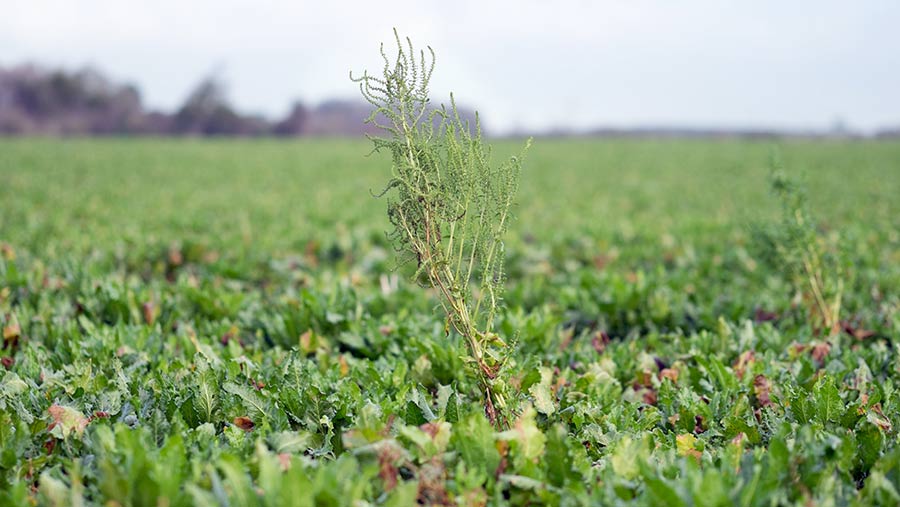Three product approvals set to benefit root crop growers
With many crop protection products under threat, it is welcome news that root crop growers are set to benefit from three new potential approvals over the next two years. Farmers Weekly travelled to Lincolnshire to see them in demonstration trials.
1. Smart system will cut number of sugar beet herbicide sprays
A herbicide-tolerant sugar beet is set to offer growers a cheaper way to manage stubborn weeds within the next two years.
The novel sugar beet variety and bespoke herbicide, set for commercialisation in 2020, is the result of a collaboration between agrochemical manufacturer Bayer and plant breeder KWS.
Herbicides represent a large chunk of sugar beet growers’ variable costs and, depending on a farm’s approach, several sprays can be applied to keep crops weed-free.
See also: How to manage disease in sugar beet crops
The new Conviso Smart system devised by the two companies will allow growers to cut that down to just one or two sprays of Bayer’s new acetolactate synthase (ALS) inhibitor herbicide formulation, currently coded as SP25473.
Containing foramsulfuron – a contact acting herbicide familiar to maize growers in Maister – and contact and residual active thiencarbazone-methyl, the product will be applied as a single 1 litre/ha hit at the 2-4-leaf stage of fat hen (a marker weed).
Alternatively, two 0.5 litre/ha hits – the first at the 2-leaf stage of fat hen and the next 10-14 days later – can be used in dry conditions where a longer window of activity may be required.
Good control
Both options gave impressive control in demonstration trials at Bayer’s Long Sutton site, with a range of broad-leaved weeds well controlled and good activity on blackgrass shown, too. The system will also be useful where weed beet is a problem.

© Tim Scrivener
Bayer CropScience’s root crops campaign manager Edward Hagues says the first variety has the potential to produce commercially viable yields, aided by the enhanced crop safety of the system.
Where conventional sugar beet can be checked by early herbicide applications in certain conditions, Conviso Smart is able to grow away unhindered.
He adds that weed resistance management will be crucial for growers looking to use the system, with resistance to ALS chemistry already present in several grasses and broad-leaved species.
“Growers will have to use it [the system] responsibly and think carefully about the [alternative] chemistry they are using elsewhere in the rotation.”
The potential of ALS-resistant weed beet may also be a concern but, as with any sugar beet crop, bolters should be pulled before they set seed, so practicing good field hygiene will reduce risk, adds Mr Hagues.
2. New-to-the-UK herbicide set to bolster spud weed control
With the loss of linuron, potato growers will be pleased to hear the approval process for an alternative herbicide from Bayer CropScience is now “full steam ahead”.
Aclonifen has been widely used on the continent for about 15 years, helping to control weeds in potato, pulse and veg crops and looks set to be approved in the UK by 2019.
Under the temporary name SP01644, it has useful activity on a range of grass and broad-leaved weeds, including small nettle, brassica weeds such as charlock, orache and polygonums.
It will bring a unique mode of action to the potato crop, applied pre-emergence and taken up by the weed’s hypocotyl, cotyledons and coleoptile and translocated to the meristems, causing a beaching effect to stunt and kill the target.

© Tim Scrivener
Although the product stands up well on its own, a common and more robust mix favoured by European spud growers is a 2 litres/ha application in combination with 2kg/ha Artist (flufenacet + metribuzin).
The two together provided the best weed control results at Long Sutton, showing good control of the background broad-leaved weed population and some activity on blackgrass.
Bayer says the product will be competitively priced at a point that will encourage growers to adopt it as their go-to pre-emergence product.
Initially it will have a full-label approval for potatoes, with the hope peas and beans will be added in due course. The company also expects to receive several applications for off-label approvals, most notably to fill the gap left by linuron in carrots, parsnips and onions.
3. Novel liquid nematicide adds flexibility to soil pest control
A novel nematicide has a “reasonable chance” of being approved for the 2019 potato season and will provide growers with an alternative or complementary option to granular products for controlling nematode pests.
Nematodes are the most important potato pests in the UK and they have the potential to cause substantial yield losses.
Currently under the coded name AR83685, agrochemical manufacturer Bayer CropScience has made no secret of its development for some time, but is now confident of approval ahead of next season.
Containing SDHI fungicide fluopyram, the company stumbled across its activity against nematodes and has created a bespoke product that offers a completely new mode of action for nematode control in a liquid suspension concentrate (SC) formulation.
Mr Hagues says this gives growers flexibility, as it can be used in-furrow if a farm is set up with kit for similar applications, such as Amistar (azoxystrobin), or as an overall application to the soil before being incorporated during the bed forming process.

© Tim Scrivener
Trials suggest there is little difference in efficacy between the two methods, with the product helping to maintain canopy in the presence of potato cyst nematode (PCN), protecting yield and managing population increases.
In addition to activity on PCN, the product has also given impressive reductions of spraing, a tuber disease caused by tobacco rattle virus (TRV) and spread by free-living nematodes.
A short harvest interval and very low application rates – a maximum total dose of 0.625 litres/ha – means the product is likely to gain a following among growers of short-duration crops, such as salads, where nematicide residues can be a worry.
